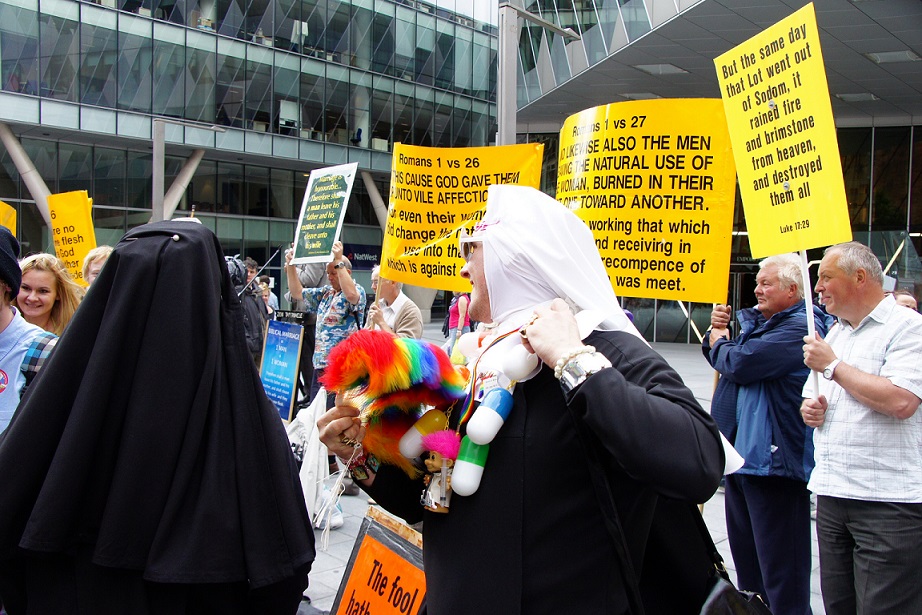I have to wonder what could possibly be motivating gay and gay-affirming Christians to stay in the church. Last week, another one was unceremoniously tossed out:
Julie Rodgers rocked the evangelical world last year when Wheaton College announced they would be hiring the celibate gay Christian as an associate for spiritual care in the Chaplain’s office. In a new blog post, Rodgers announces her affirmation of same-sex relationships and marriage equality.
And Wheaton College says Rodgers has since resigned.
… Pastor Denny Burk says she shouldn’t be treated like a Christian any longer and Eric Teetsel of the Manhattan Declaration says Wheaton College owes the students an apology.
Just as we saw with the World Vision fiasco, every tiny, tentative step taken by Christian groups to be more inclusive and welcoming to LGBT people meets with an immediate and ferocious backlash that inevitably results in them not only restoring the original, prejudiced policy, but doing more harm on top of it. By firing Rodgers, Wheaton has sent the message not only that the celibacy rule will remain, but that it’s forbidden even to question it.
In the post announcing her change of heart, Rodgers says that the Christian demand for all LGBT people to remain celibate forever isn’t realistic, and that even when stated with the best intentions, it conveys a message of exclusion and shame. She adds that she’s “quietly supported” same-sex relationships for a while but has only now decided to speak out. (This is a big turnaround from a post of hers from just two years earlier where she praises celibacy, calls it “mystically beautiful” and says she hates how it’s portrayed as “a burdensome message of misery”. Evidently she was fooling herself all along.)
Along the same lines, Rachel Held Evans has written about how “the apocalyptic, fear-based rhetoric” she’s heard from Christians in the aftermath of the Supreme Court’s Obergefell decision is “doing some real harm”. She says she’s received “at least a dozen messages from friends and readers” telling her that the reaction to that ruling “confirmed for them what they’ve known in their hearts for a while: they don’t want anything to do with Christianity anymore, not if this is what it’s all about”. (I had to laugh when I read how she pointed out to a Christian friend that an anti-gay story he’d shared on social media wasn’t true, to which he replied, “Well, it might as well be.”)
And Eliel Cruz, a Seventh-Day Adventist, confesses “I have to force myself to go to church” because, after he came out as bisexual, “I no longer felt welcome at worship”. He laments hearing sermons that treat LGBT people as if they were nothing but “sex acts” and preachers who won’t “do more than condemn”.
The list goes on and on. Gay Christians, straight Christians who want to be gay allies, or even Christians who simply believe that the issue of gayness and gay relationships should be open to debate have found themselves fired, kicked out, silenced, denied tenure, or retaliated against in any number of ways for taking even the tiniest deviation from the path of strict orthodoxy. As the world leaves them behind, the gatekeepers of Christianity are refusing to budge, and the courageous few who call for change are being ground up and spat out.
I might disagree with them about theology, but I think all the writers I mentioned in this post are good people whose hearts are in the right place. What I have to ask is this: Why on earth do you still consider yourselves Christian? What attachment do you have to a faith that’s treated you and your loved ones with suspicion, hostility and contempt at every turn?
I understand the stubborn refusal to let the bullies chase you out. I sympathize with the desire to make your community a better, more inclusive place. Believe me, I know all about those things. But as my friend Mary Johnson says, there comes a point where you have to ask where your energies are best spent. Do you really believe that the church is going to change in your lifetime, or ever? Wouldn’t it be easier just to be an atheist?
I’m not saying the atheist community is faultless, far from it. We’ve made our share of mistakes; we’ve often been imperfect allies. But one thing I can say with confidence is that, as a gay, lesbian, bisexual, or queer atheist, you won’t have to engage in these perpetual, exhausting battles over your right to exist, to marry, or to love. You won’t have to bother with the intellectual gymnastics necessary to reinterpret the immutable commandments of ancient dogma. You’re enormously less likely to face institutional resistance or discrimination. And you certainly won’t hear prominent atheists line up to denounce you or fling around nasty slurs about your identity.
Wouldn’t it be such a relief to just be, to live your life honestly and without apology, without all this worry about bigotry and rejection? You can. All you have to do is walk away from this rigid, cruel and hidebound religion, give up these beliefs that have caused such enormous guilt, pain and suffering to LGBT people throughout the ages, and come join the rest of us outside, in the sunlight and freedom of the secular community. Your life could be so much easier, so much happier. What’s holding you back?
Image credit: Stuart Grout, released under CC BY 2.0 license
